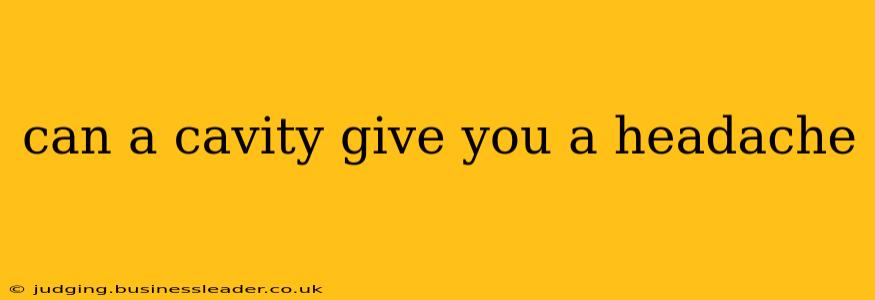A throbbing toothache is miserable enough, but could that nagging cavity actually be causing your headache? The short answer is: yes, it's possible. While not all headaches stem from dental issues, a cavity can certainly contribute to head pain, especially if it's progressed to an infection or abscess. Let's explore the connection in detail.
How Can a Cavity Cause a Headache?
The link between cavities and headaches lies primarily in the intricate network of nerves and blood vessels in your head and face. A cavity, particularly a deep one, can irritate the pulp (the soft tissue inside your tooth containing nerves and blood vessels). This irritation can trigger pain signals that travel along the trigeminal nerve, a major nerve responsible for sensation in your face, including your teeth, and also parts of your head. The resulting pain can manifest as a headache, often localized to one side of the head or around the jaw and temple areas.
What Types of Headaches Can Cavities Cause?
Cavity-related headaches aren't usually the classic migraine or tension headache. Instead, they often present as:
- Referred pain: This is pain felt in one area of the body but originating from another. In this case, the pain starts in the tooth but is perceived as a headache.
- Sinus headaches: If the infection from a cavity spreads to the sinuses, it can cause sinus pressure and pain, mimicking a sinus headache. This is more likely if the upper molars are affected.
- Tension-type headaches: The constant discomfort from a painful tooth can lead to muscle tension in the jaw and neck, resulting in tension-type headaches.
Can a Tooth Infection Cause a Headache?
Yes, absolutely. An untreated cavity can easily develop into an infection, often leading to an abscess (a pocket of pus). An abscess puts significant pressure on the surrounding tissues and nerves, amplifying the pain and making headaches far more likely. The infection can also spread to other areas, causing more widespread pain and potentially more serious health problems.
What are the symptoms of a tooth infection?
Symptoms of a tooth infection, beyond pain and headaches, might include:
- Severe, throbbing toothache: This is often worse at night.
- Sensitivity to hot and cold: Your tooth might be extremely sensitive to temperature changes.
- Swelling in the gums or face: Inflammation around the infected tooth is common.
- Fever: A sign your body is fighting the infection.
- Bad taste in your mouth: Pus from an abscess can contribute to a foul taste.
How to Tell if Your Headache is Cavity-Related
It's crucial to distinguish between a headache caused by a cavity and other types of headaches. If your headache:
- Is localized to one side of the head or around your jaw: This suggests a possible dental origin.
- Is accompanied by toothache, sensitivity, or swelling: These are strong indicators of a dental problem.
- Is worsened by chewing or biting: This points towards a problem with your teeth.
If you experience any of these symptoms, it's vital to see a dentist immediately. They can accurately diagnose the cause of your pain and provide the necessary treatment.
When to See a Dentist
Don't delay seeking professional help if you suspect a connection between your headache and a cavity. Early intervention can prevent the infection from spreading and minimize the severity of the pain. A dentist can examine your teeth, take X-rays if necessary, and recommend the appropriate treatment, whether it's a simple filling or more extensive procedures. Ignoring the problem can lead to more severe complications, including the need for root canals, extractions, or even hospitalization in cases of severe infection.
Can other dental problems cause headaches?
Yes, several dental problems besides cavities can lead to headaches. These include:
- Gum disease (periodontitis): Infection and inflammation in the gums can cause pain that radiates to the head.
- Temporomandibular joint (TMJ) disorders: Problems with the jaw joint can lead to headaches and facial pain.
- Bruxism (teeth grinding): This can cause jaw muscle pain and tension headaches.
Regular dental checkups and good oral hygiene are essential for preventing dental problems and minimizing the risk of headaches related to dental issues. Remember, your oral health and overall health are interconnected.
